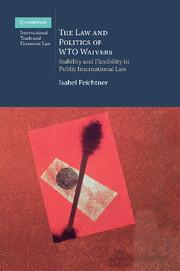Book contents
- Frontmatter
- Contents
- Acknowledgements
- 1 Why study the WTO waiver?
- Part I The stability/flexibility challenge in public international law and particularly the WTO
- Part II The practice and law of waivers
- Part III The potential of waivers to address the stability/flexibility challenge in international law
- Bibliography
- Index
Part I - The stability/flexibility challenge in public international law and particularly the WTO
Published online by Cambridge University Press: 05 December 2011
- Frontmatter
- Contents
- Acknowledgements
- 1 Why study the WTO waiver?
- Part I The stability/flexibility challenge in public international law and particularly the WTO
- Part II The practice and law of waivers
- Part III The potential of waivers to address the stability/flexibility challenge in international law
- Bibliography
- Index
Summary
The stability/flexibility challenge in public international law and particularly the WTO
In the first part of this book I set out the premises, as well as the research questions, which inform my analysis of the WTO's waiver power. Chapter 2 briefly presents the flexibility challenges that arise if transnational societal interests are protected or promoted through international law in a way that restricts domestic self-government. Such challenges concern, first, the relationship between domestic and international governance, second, the adaptability of legal norms to transnational needs and preferences and, third, the coordination and linkage of different international legal regimes. While these challenges arise from international governance through law, the claim is not to do away with law or to ‘soften’ it. Instead, it is argued that law performs an important function in legitimate international governance, and that to perform this function its validity needs to be based on formal requirements. Validity and flexibility need to be reconciled through law-making procedures that may take account of the identified flexibility challenges.
- Type
- Chapter
- Information
- The Law and Politics of WTO WaiversStability and Flexibility in Public International Law, pp. 5Publisher: Cambridge University PressPrint publication year: 2011

